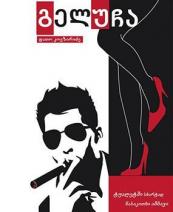GELUCHA
KOVZIRIDZE DAVIT
First novel of David Kovziridze’s trilogy. As the author deliberately warns us, it can easily be read in one session in the lavatory. Three separate stories develop in parallel and, from time to time, intersect, and in the epilogue they are combined. Gelucha is a mirror to today’s society, and it is a parody. A very funny comic mosaic of a novel, which tells us about people who are apparently different, but who in reality are sadly much the same. The free-flowing style of writing misleads you in such a way, that in three utterly different stories, with quite a few additions, you almost never detect any fragmentation. This is yet another one of the author’s achievements: to create a unified text from different moods, periods, and characters from different social layers who are active in just as varied circumstances. We could call this novel by its second subtitle, Stories of the Fatherland. It has everything: a street like ours, the Caucasian urge to find Odessa(s), football mania, a girl gang, an ocean of snobbery (Jazzes), everlasting art… And, regrettably, politics. The light-touch writing, the caricature-like heroes portray more than a merely comic image. If we read the work attentively, foreign people, like the three independent stories, are united by some qualities or signs and take on the same colouring. The tragic nature of the characters lies in the fact that they seem to become aware even of their own limitations. In an era of global internetisation and social networking, were goats and wolves graze together, we can feel the pulse of quasi-nationalism. Read, for example, the following phrase: ‘Gela Pirtsignakishvili (pirtsignaki is the Georgian name for Facebook), who is known as Facebookman’, and you will probably recognize something, perhaps your self. Or you will look for a parody of such a big pseudo-organization in such a name as ‘General Secretary of the Mingrelian Regional Office of the National Charter for the Protection of Iberian Cows’. You will be struck by similar stories: ‘The day before the wedding, Ucha went to see Father Guja to say confession. In the morning he shot up on heroin, drank his coffee and floored the accelerator’. The author succeeds very nicely in Georgianizing his characters (Capello, Terim, Pele and others), and in Georgianizing words: this is a real masterpiece in being bilingually idiomatic: "Fuck the future". The novel’s final chapter is called ‘In lieu of an epilogue’. Inspired by the form of a review, we too ought to write something like an afterword. Let’s write one, but only a good one, because one reason for the addition of authors like David Kovziridze to literature is that tomorrow the harvest of Georgian prose, which has seen so much tribulation, will be better.
‘It’s not all that common for a novice author to be backed by experience and, above all, by a culture of writing. With a very few exceptions, Georgian literature offers us examples of the opposite. That is why very many talented creative people, who may, let’s say, lay down a story remarkably well and who are not let down by their imagination, nevertheless, as Soviet periodicals of the 1930s used to put it, often can’t ‘find the right words’.
G. Kekelidze, writer, literaty critic/
Extract will be available soon
In case of using the information, please, indicate the source
